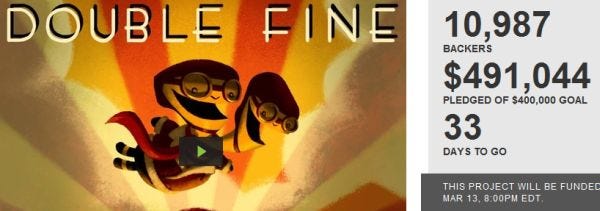Thought: Double Fine's Kickstarter Asks Big Questions
Tim Schafer says he wants to make an old-school graphic adventure. He also says it's impossible to get publisher funding for such a project. So he turns to the audience, and asks if they want to pay to fund such a thing directly. Via Kickstarter he sets the target at $400,000, probably feeling a little bit guilty about how high a number he's put down, but also aware that it's a very small budget for a game these days. That's at 2am GMT. But 10.15am, barely eight hours later, the goal is reached, and the number still climbing. People found $400,000 they wanted to spend on a game - and in this case, just the idea of a game - purely because of who is making it. And that asks some big questions of the current position of the majority of publishers.
Clearly an adventure by Tim Schafer and Ron Gilbert is a somewhat exceptional example. That's two out of the three people who created Monkey Island (with Dave Grossman currently at TellTale). But it's important to note this is an exceptional example that couldn't receive funding from a publisher. Adventures, especially those that aren't aiming to redefine the genre (ie. by not actually being an adventure), aren't considered a worthy investment these days... to a degree. Clearly Germany is churning them out, there are wonderful indie examples all the time, and the aforementioned TellTale produces about 689 of them a year. But still a standalone, big-budget, full scale adventure from the US is a rarity. The reality is, publishers aren't interested in taking a risk on something like this.
And normally, that's because businessmen know what they're doing. Shocking statement. They know the way to maximise profits is to work with established IPs, or those similar enough to established IPs that no one's going to notice. THQ who pushed toward lots of original games in recent times have just seen their money run away, screaming. That doesn't bode well for others who are tempted to do such a thing, and we'll see how EA's risks with Kingdoms Of Amular and the like pay off.
But it does also demonstrate a naivety for the possibility of making smaller amounts of money on smaller projects, those that don't cost $30m in advertising budgets. And it also raises a really important point about people's willingness to part with money, in an industry so convinced everyone wants to "steal".
Of course, the astonishing success of Schafer's Kickstarter is only one example of the gaming audience's desire to empty their wallets. The bundle phenomenon, where customers can choose to pay just a penny, or as much as they want, have shown quite how much people are willing to volunteer when they want something. Hell, the entire Linux community and its self-funding model is an unavoidably colossal, despite most people ignoring it. The reality is, people like to pay for stuff - in fact, they'll go out of their way to pay for stuff, pay more than asked, and even for products that don't yet exist, just in good faith.
And then there's DRM. This discrepancy is so interesting. Publishers so rigid with fear about a perceived threat from piracy that they're panicking and doing the stupidest thing imaginable - punishing legitimate customers, while leaving piracy unaffected - while elsewhere hundreds of thousands of players are throwing money at games they could legitimately get for free, or just to make them happen.
I don't believe for a second that Kickstarter-style projects are a threat to publishers - no such thing. Just as independent cinema may no longer need to go through a major distributor to reach an audience, big budget films are so entrenched in the system that money means it will stay that way for a lot longer. It's unlikely that Infinity Ward will be raising $100m to create a new Modern Warfare through donations from their audience. But it does, I believe, raise questions publishers need to be asking themselves. Questions like: Are we really in touch with our audience's desires?
It also raises an even more interesting question for developers who aren't at the extremes of multi-million dollar projects. The question of whether a middleman is a confidence trick the entire industry has fallen for for too long. Indies have long known that there's no need to seek a publishing deal to reach a large audience, and with digital distribution models becoming the norm, the only barrier between a developer and its audience is bandwidth. But if Double Fine can go this route, so can any number of developers you'd care to mention.
Clearly distribution still remains an issue. If you're not on Steam, you're not going to reach the largest audience, and with a rumoured cut of around 30%, there's still very much a middleman. Of course, the developer getting 70% of the game price is astronomically higher than anything that would be seen were a publisher involved too, and as alternatives like Desura and the like get larger, getting to a large enough audience will be simpler. So why should such things remain the province of the indie?
As I write, the $400,000 target for Schafer's game is reaching $500,000. People aren't interested in the goal being passed - they're still giving - and this is 12 hours into a month-long fund raise. (Also check out The Order Of The Stick's extraordinary Kickstarter, which is 1000% over its $58k target, with 12 days to go.) Democratic patronage is a reality, despite an industry norm that is so paranoid it goes out of its way to punish those who pay.
That money is out there, and people are willing to part with it. If publishers want to understand the modern gamer, they need to start considering this, and heavily rethink how they go about receiving that money. And developers even more so should be sitting up and noticing that if their product appears worthwhile, people will want to fund it, without the developer having to sacrifice their money, creativity and even the possibility of the entire product to a publisher.
Another $10,000 was added to Double Fine's fund in the time it took me to write those two paragraphs. That's the scale we're dealing with here.











